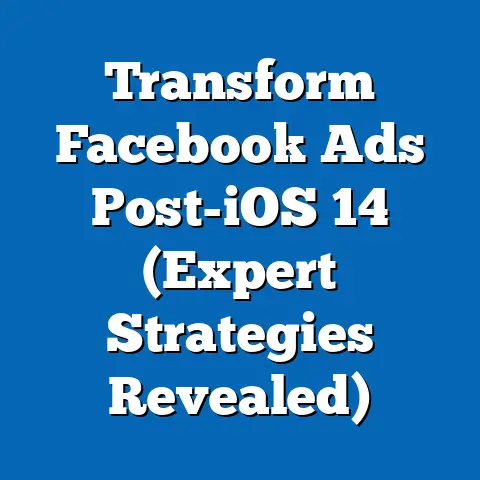Unlocking Facebook Ads Support Tickets (Expert Solutions)
Imagine a bustling 1950s advertising agency, where executives in sharp suits huddle over typewriters and sketchpads, crafting print ads for newspapers and glossy magazines, while cigarette smoke lingers in the air. Contrast this with today’s digital landscape, where a solo entrepreneur, armed with a laptop and a Wi-Fi connection, navigates the complex algorithms of Facebook Ads Manager to target a global audience with a single click. This stark juxtaposition highlights the seismic shift in advertising paradigms over the past few decades, driven by technological innovation and generational change.
The rise of digital advertising, epitomized by platforms like Facebook (now Meta), has redefined how businesses connect with consumers, particularly among younger, tech-savvy generations such as Millennials and Gen Z. However, with this innovation comes complexity, and many advertisers—ranging from small business owners to seasoned marketers—find themselves grappling with technical issues, policy violations, and account restrictions. This is where the intricate world of Facebook Ads support tickets emerges, a critical yet often frustrating lifeline for resolving platform-specific challenges.
Section 1: Generational Context of Digital Advertising
1.1 Defining the Digital Generations: Millennials and Gen Z
The primary users of Facebook Ads are often from the Millennial (born 1981–1996) and Gen Z (born 1997–2012) cohorts, generations that have grown up with the internet and social media as integral parts of their lives. Millennials, often dubbed the first “digital natives,” came of age during the dot-com boom and the early days of social networking, witnessing the launch of Facebook in 2004. Gen Z, on the other hand, has never known a world without smartphones or social media, making them hyper-connected and highly adept at navigating digital platforms.
These generations differ from their predecessors—Baby Boomers (born 1946–1964) and Gen X (born 1965–1980)—who often approach technology with a learning curve, having transitioned from analog to digital systems. While Boomers and Gen X may use Facebook Ads for business purposes, their engagement often lacks the intuitive fluency seen in younger users. This generational divide shapes not only who uses the platform but also how they interact with its tools and support systems.
1.2 Historical Context: From Print to Pixels
The transition from traditional to digital advertising mirrors broader societal shifts influenced by technological advancements. In the mid-20th century, Baby Boomers were shaped by post-World War II economic prosperity, with advertising focused on mass media like television and radio. Gen X experienced the rise of cable TV and personal computers, marking the beginning of targeted marketing.
By the time Millennials and Gen Z entered the scene, the internet had revolutionized communication, with social media platforms like Facebook becoming central to advertising strategies. Launched in 2004, Facebook initially served as a college networking tool before expanding into a global behemoth with over 2.9 billion monthly active users by 2023 (Statista, 2023). Its advertising platform, introduced in 2007, allowed businesses to target users with unprecedented precision, a feature that became indispensable for younger generations accustomed to personalized content.
1.3 Societal Implications: A Digital Dependency
The reliance on platforms like Facebook for advertising reflects a broader societal shift toward digital dependency, particularly among younger generations. For businesses, especially small and medium-sized enterprises (SMEs) run by Millennials and Gen Z entrepreneurs, Facebook Ads offer a cost-effective way to reach niche audiences. However, this dependency comes with challenges, including navigating complex algorithms, policy changes, and technical glitches—issues that often require support tickets to resolve.
Moreover, the digital divide between generations exacerbates inequities in access to these tools. While younger users may quickly adapt to platform updates, older generations or less tech-savvy individuals often struggle, highlighting the need for accessible support systems. This generational dynamic underscores the importance of understanding how to effectively engage with Facebook’s support infrastructure, a topic we will explore in depth.
Section 2: The Landscape of Facebook Ads Support Tickets
2.1 What Are Support Tickets and Why Do They Matter?
A support ticket in the context of Facebook Ads is a formal request submitted through the platform’s help center to address issues such as account suspensions, ad disapprovals, billing discrepancies, or technical errors. These tickets serve as a direct line of communication between advertisers and Meta’s support team, often determining whether a campaign can continue or must be halted indefinitely.
For many advertisers, especially those reliant on digital marketing for revenue, unresolved support tickets can lead to significant financial losses. According to a 2022 survey by Hootsuite, 68% of small businesses reported that delays in resolving ad platform issues directly impacted their sales. This underscores the critical nature of efficient support systems in a digital-first economy.
2.2 Common Challenges with Support Tickets
Navigating Facebook Ads support tickets is often cited as a frustrating experience, even for tech-savvy users. Common issues include long response times, automated replies that fail to address specific problems, and a lack of transparency regarding resolution processes. For instance, a policy violation ticket might result in a generic message citing “community standards,” leaving advertisers unclear about the exact infraction.
These challenges are compounded by the platform’s scale—Meta handles millions of support requests daily, often prioritizing larger accounts or enterprise clients over smaller advertisers. This disparity can disproportionately affect Millennial and Gen Z entrepreneurs who may lack the resources to escalate issues through alternative channels.
2.3 Generational Differences in Navigating Support
Generational attitudes toward technology influence how users approach support tickets. Millennials and Gen Z, accustomed to instant gratification through apps and social media, often express frustration with delayed responses, expecting real-time solutions. In contrast, older generations like Gen X or Boomers may exhibit more patience but struggle with the platform’s interface or terminology, requiring more hand-holding from support teams.
This divergence highlights the need for tailored support experiences that account for varying levels of digital literacy. It also raises questions about equity in access to resolution, as younger users may be more adept at finding workarounds or leveraging online communities for advice.
Section 3: Expert Solutions for Unlocking Facebook Ads Support Tickets
3.1 Proactive Measures: Preventing Issues Before They Arise
The first step in managing support tickets is prevention, a strategy that aligns with the proactive mindset of younger generations who value efficiency. Advertisers should thoroughly review Meta’s advertising policies before launching campaigns, paying close attention to prohibited content categories such as misleading claims or sensitive topics. Regularly updating payment information and ensuring account verification can also prevent billing or access issues.
Additionally, leveraging tools like Facebook’s Ads Manager diagnostics can help identify potential problems before they escalate into support tickets. For instance, running a pre-check on ad creatives for policy compliance can save time and resources, a practice that resonates with the problem-solving ethos of Millennials and Gen Z.
3.2 Crafting Effective Support Tickets
When issues do arise, crafting a clear and concise support ticket is crucial for a timely resolution. Advertisers should include specific details such as campaign IDs, error messages, and screenshots to provide context, avoiding vague descriptions that delay the process. Using a professional tone and avoiding emotional language can also improve the likelihood of a favorable response, as support teams prioritize actionable requests.
Data from a 2021 study by Social Media Today indicates that tickets with detailed documentation are resolved 40% faster than those with incomplete information. This statistic underscores the importance of precision, a skill younger generations often excel at due to their familiarity with digital communication.
3.3 Escalation Strategies and Alternative Channels
For high-priority issues, advertisers with significant ad spend may qualify for dedicated account managers through Meta’s Business Support program. While this option is less accessible to smaller businesses, it highlights the disparity in support access and the need for persistent advocacy.
3.4 Leveraging Third-Party Tools and Expertise
In cases where internal support fails, third-party tools and consultants offer viable solutions. Platforms like Zendesk or Freshdesk can integrate with Meta’s systems to track ticket progress, while marketing agencies specializing in Facebook Ads often have insider knowledge of escalation protocols. These resources can be particularly beneficial for less tech-savvy users or those from older generations who may find the platform’s interface overwhelming.
However, reliance on external expertise comes with costs, both financial and in terms of data privacy. Advertisers must weigh these trade-offs, a decision that often reflects generational attitudes toward outsourcing and technology adoption.
Section 4: Societal and Economic Implications of Support Challenges
4.1 Impact on Small Businesses and Entrepreneurship
The challenges of navigating Facebook Ads support tickets have profound implications for small businesses, many of which are led by Millennial and Gen Z entrepreneurs. A single unresolved ticket can halt a marketing campaign, leading to lost revenue and diminished brand visibility. According to a 2023 report by the Small Business Administration, 45% of SMEs cited digital advertising disruptions as a major barrier to growth, a statistic that underscores the economic stakes.
This issue also perpetuates inequality, as larger corporations with dedicated support often bypass these hurdles, leaving smaller players at a disadvantage. The generational lens adds another layer—younger entrepreneurs, while digitally adept, may lack the capital to absorb delays, amplifying the need for equitable support systems.
4.2 Cultural Shifts: Expectations of Instant Resolution
Culturally, the reliance on digital platforms has fostered an expectation of instant resolution, particularly among younger generations raised on real-time communication. When support tickets fail to meet this expectation, frustration ensues, often spilling over into public forums or social media critiques of Meta’s practices. This phenomenon reflects a broader shift toward transparency and accountability in tech, driven by Millennials and Gen Z who prioritize corporate responsibility.
Conversely, older generations may exhibit more tolerance for delays, shaped by pre-digital experiences with slower customer service models. This cultural divergence highlights the need for Meta to adapt its support framework to diverse user expectations, balancing speed with thoroughness.
4.3 Workplace Dynamics: Skills and Training Needs
In workplace settings, the complexities of Facebook Ads support tickets underscore the importance of digital literacy across generations. Companies must invest in training employees—particularly those from Gen X or Boomer cohorts—to navigate these systems effectively, bridging the generational skills gap. Younger workers, while often more adept, may require guidance on patience and strategic communication when dealing with unresolved tickets.
This dynamic also shapes hiring trends, with businesses increasingly valuing candidates who demonstrate proficiency in digital advertising tools. As a result, generational differences in tech fluency become a competitive factor, influencing career trajectories and workplace hierarchies.
Section 5: Technological and Policy Considerations
5.1 The Role of Automation and AI in Support Systems
Meta’s reliance on automation for handling support tickets reflects broader technological trends, with AI-driven chatbots often providing initial responses. While this streamlines high-volume requests, it can frustrate users seeking personalized solutions, particularly younger generations accustomed to tailored digital experiences. Enhancing AI to better interpret nuanced issues could bridge this gap, though it requires significant investment and refinement.
Moreover, automation raises ethical questions about accountability, as users often feel dismissed by generic replies. Balancing efficiency with human oversight remains a key challenge for Meta, one that impacts trust across generational lines.
5.2 Policy Transparency and User Empowerment
Meta’s advertising policies, often cited in support ticket responses, are notoriously complex and subject to frequent updates. Greater transparency—such as detailed explanations of violations or proactive policy notifications—could reduce ticket volume and improve user satisfaction. This aligns with the advocacy mindset of Millennials and Gen Z, who often demand clarity from tech giants.
Empowering users through self-service tools, such as policy simulators or real-time chat support, could also mitigate reliance on tickets. However, implementing these features requires addressing the digital divide, ensuring accessibility for less tech-savvy generations.
Section 6: Forward-Looking Insights and Uncertainties
6.1 The Future of Digital Advertising Support
As digital advertising continues to evolve, so too must support systems like Facebook Ads tickets. The integration of advanced AI, coupled with a focus on user-centric design, could revolutionize resolution times and satisfaction rates. However, uncertainties remain, including Meta’s willingness to prioritize smaller advertisers and the potential for regulatory oversight to reshape platform policies.
Generational shifts will also play a role, as Gen Alpha (born 2013–present) enters the digital landscape with even higher expectations for seamless tech experiences. Preparing for these changes requires proactive adaptation from both Meta and its users.
6.2 Broader Societal Trends
Looking ahead, the challenges of digital advertising support reflect broader societal trends, including the growing influence of tech on economic equity and cultural norms. Addressing these challenges will require collaboration between platforms, policymakers, and users, ensuring that generational diversity is accounted for in solution design. The stakes are high—failure to adapt risks alienating entire cohorts of advertisers, with ripple effects across the digital economy.
6.3 A Call for Balance
Ultimately, unlocking Facebook Ads support tickets demands a balance between technological innovation, policy clarity, and user empowerment. While expert solutions offer immediate relief, long-term progress hinges on systemic change, a prospect fraught with uncertainty. As generational dynamics continue to shape digital engagement, the path forward remains both challenging and ripe with opportunity.
Conclusion
The world of Facebook Ads support tickets encapsulates the broader generational and technological shifts defining modern advertising. From the digital fluency of Millennials and Gen Z to the historical transition from print to pixels, the stakes of effective support systems are evident across economic, cultural, and workplace domains. By embracing proactive strategies, crafting precise tickets, and advocating for systemic improvements, advertisers can navigate these challenges while pushing for a more equitable digital landscape.
As we look to the future, the interplay of generational expectations and technological advancements will continue to shape how support is delivered and experienced. While uncertainties persist, the opportunity to redefine digital advertising support for a diverse user base offers a compelling horizon—one that demands attention, innovation, and collaboration.






